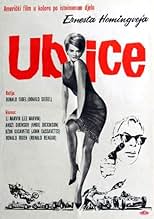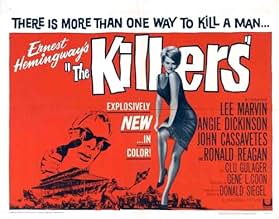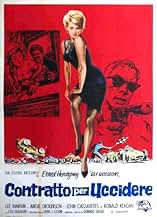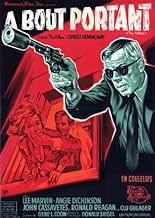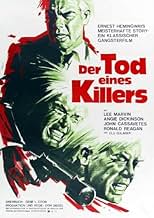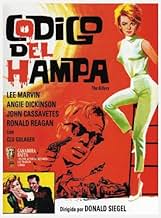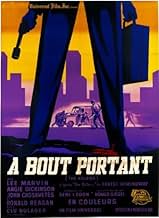AVALIAÇÃO DA IMDb
7,0/10
10 mil
SUA AVALIAÇÃO
Surpreendidos por a vítima não ter tentado fugir deles, dois assassinos profissionais tentam descobrir quem os contratou e por quê.Surpreendidos por a vítima não ter tentado fugir deles, dois assassinos profissionais tentam descobrir quem os contratou e por quê.Surpreendidos por a vítima não ter tentado fugir deles, dois assassinos profissionais tentam descobrir quem os contratou e por quê.
- Direção
- Roteiristas
- Artistas
- Ganhou 1 prêmio BAFTA
- 1 vitória e 1 indicação no total
Irvin Mosley Jr.
- Mail Truck Guard
- (as Irvin Mosley)
- Direção
- Roteiristas
- Elenco e equipe completos
- Produção, bilheteria e muito mais no IMDbPro
Avaliações em destaque
Under the title Ernest Hemingway's The Killers, Don Siegel's 1964 movie shows no more fidelity to the short story from which it takes its name and a fraction of its plot than Robert Siodmak's 1946 masterpiece, The Killers. And though it borrowed from the earlier movie its flashback structure (substantially simplified) and much of the backstory written for it, it's not quite a remake, either: the changes strike too deep.
A pair of contract hit-men track down a victim who seems ready, almost eager, to die. The killers this time around are Lee Marvin and Clu Gallagher, whose cozy arrangements suggest something of Fante and Mingo in The Big Combo. The first big shift from its 1946 predecessor is that Marvin's curiosity, not an insurance investigator's, sets the plot in motion, by his delving into the target's past and the whereabouts of a million dollars from a heist years before (in fact, he becomes the principal character). The second is a racheted-up level of violence: The movie opens with the pair tracking down their prey in a school for the blind, whose residents they ruthlessly terrorize during their hunt. And the level stays high.
John Cassavettes plays the victim, a former race-car driver fallen on hard times since a bad smash-up. Through the reminiscences of old buddy Claude Akins and past associate Norman Fell, we relive his racing career to an extent that stretches of the movie look like outtakes from Grand Prix. In those glory days he crossed tracks with the femme fatale of the piece, Angie Dickinson (in her rat-pack, late-Camelot salad days herself). After his car crash and their break-up, she lures him off the primrose path to serve as driver during a mail-truck robbery.
But Dickinson's heart belongs to daddy daddy in this instance being Ronald Reagan as a heavy. This marks his last film role. For a while it was chic to dismiss Reagan as a lousy actor, but he was always compentent enough. The puzzle is that the undeniable charisma that helped garner him the governorship of California and the presidency of the United States never came through on the screen; he couldn't carry a picture. He has a nasty moment slapping Dickinson silly when her attention strays to Cassavettes, but Marvin redeems his top billing by stealing the movie.
Ernest Hemingway's The Killers remains a good example of how the complexities and suggestiveness of the noir cycle were to metamorphose into a faster, flatter, more literal and brutal style of moviemaking starting in the late 1950s. Don Siegel was in the forefront of this change, starting in period noirs (The Verdict) but reaching his apogee, so to speak, in Dirty Harry. He delivers the goods, pronto, in a plain brown wrapper.
A pair of contract hit-men track down a victim who seems ready, almost eager, to die. The killers this time around are Lee Marvin and Clu Gallagher, whose cozy arrangements suggest something of Fante and Mingo in The Big Combo. The first big shift from its 1946 predecessor is that Marvin's curiosity, not an insurance investigator's, sets the plot in motion, by his delving into the target's past and the whereabouts of a million dollars from a heist years before (in fact, he becomes the principal character). The second is a racheted-up level of violence: The movie opens with the pair tracking down their prey in a school for the blind, whose residents they ruthlessly terrorize during their hunt. And the level stays high.
John Cassavettes plays the victim, a former race-car driver fallen on hard times since a bad smash-up. Through the reminiscences of old buddy Claude Akins and past associate Norman Fell, we relive his racing career to an extent that stretches of the movie look like outtakes from Grand Prix. In those glory days he crossed tracks with the femme fatale of the piece, Angie Dickinson (in her rat-pack, late-Camelot salad days herself). After his car crash and their break-up, she lures him off the primrose path to serve as driver during a mail-truck robbery.
But Dickinson's heart belongs to daddy daddy in this instance being Ronald Reagan as a heavy. This marks his last film role. For a while it was chic to dismiss Reagan as a lousy actor, but he was always compentent enough. The puzzle is that the undeniable charisma that helped garner him the governorship of California and the presidency of the United States never came through on the screen; he couldn't carry a picture. He has a nasty moment slapping Dickinson silly when her attention strays to Cassavettes, but Marvin redeems his top billing by stealing the movie.
Ernest Hemingway's The Killers remains a good example of how the complexities and suggestiveness of the noir cycle were to metamorphose into a faster, flatter, more literal and brutal style of moviemaking starting in the late 1950s. Don Siegel was in the forefront of this change, starting in period noirs (The Verdict) but reaching his apogee, so to speak, in Dirty Harry. He delivers the goods, pronto, in a plain brown wrapper.
Lee Marvin and Clu Gulager, two contract killers, walk into a Midwest school for the blind and cold-bloodedly murder John Cassavettes. "We walk in, we put him down, we walk out," muses Marvin distractedly on the train back to Chicago. Cassavettes had the chance to run but didn't, and Marvin wants to know why.
Initially, Don Siegel's colour remake of the Ernest Hemingway story was intended as the first made-for-TV movie. Vetoed by the network for its amoral viewpoint and violence, it was released in cinemas and quickly became a cult 1960s B-movie.
Anonymous and menacing in executive suits, sunglasses and briefcase, Marvin and scene-stealing Gulager memorably personify organised crime under Siegel's expert direction. They're pure all-American evil.
True, the main plot - pieced together in flashback as the two hitmen track down the mail robbery gang led by Ronald Reagan (his last film) - is pretty routine stuff. But even that serves to heighten the threat represented by Marvin and Gulager, as they unravel the real reason for Cassavettes' deathwish.
"No one ever knows what we're talking about," mocks Gulager when femme fatale Angie Dickinson tries to act dumb. The scene in the hotelroom where the killers force her to tell is handled with a ferocious cool that is Siegel's trademark.
The Killers was still in production when Kennedy was assassinated - perhaps one reason, given its theme, why TV network ABC pulled it from their 1964 schedule. The scene where Gulager is shot down on a sunlit sidewalk even echoed the killing of Kennedy assassin Lee Harvey Oswald (Gulager's character is called Lee).
OK, it's not a masterpiece. Even the great Don Siegel can't quite disguise a B-movie budget, a repetitious screenplay, brightly artificial colour, and exteriors that are only too obviously the Universal backlot. But it is tense and exciting, thanks to Siegel's authoritative grasp of the genre.
"I shot it in the style which I think is my style at its best," Siegel concluded later. "Very taut and lean with great economy. If I had to do it over again, I don't think I would change much."
Initially, Don Siegel's colour remake of the Ernest Hemingway story was intended as the first made-for-TV movie. Vetoed by the network for its amoral viewpoint and violence, it was released in cinemas and quickly became a cult 1960s B-movie.
Anonymous and menacing in executive suits, sunglasses and briefcase, Marvin and scene-stealing Gulager memorably personify organised crime under Siegel's expert direction. They're pure all-American evil.
True, the main plot - pieced together in flashback as the two hitmen track down the mail robbery gang led by Ronald Reagan (his last film) - is pretty routine stuff. But even that serves to heighten the threat represented by Marvin and Gulager, as they unravel the real reason for Cassavettes' deathwish.
"No one ever knows what we're talking about," mocks Gulager when femme fatale Angie Dickinson tries to act dumb. The scene in the hotelroom where the killers force her to tell is handled with a ferocious cool that is Siegel's trademark.
The Killers was still in production when Kennedy was assassinated - perhaps one reason, given its theme, why TV network ABC pulled it from their 1964 schedule. The scene where Gulager is shot down on a sunlit sidewalk even echoed the killing of Kennedy assassin Lee Harvey Oswald (Gulager's character is called Lee).
OK, it's not a masterpiece. Even the great Don Siegel can't quite disguise a B-movie budget, a repetitious screenplay, brightly artificial colour, and exteriors that are only too obviously the Universal backlot. But it is tense and exciting, thanks to Siegel's authoritative grasp of the genre.
"I shot it in the style which I think is my style at its best," Siegel concluded later. "Very taut and lean with great economy. If I had to do it over again, I don't think I would change much."
Don Siegel's 'The Killers' is a diamond in the rough! Initially filmed for television, its technical limitations are easily overlooked as they are more than compensated for by the drive of the no-nonsense narrative, and the high standards of the acting. Caught somewhere between Kubrick's 'The Killing' and Boorman's 'Point Blank', it may not be as flamboyantly impressive as either, but it is just as memorable in its own low key way.
Quentin Tarantino has admitted that the structure of 'The Killing' has influenced him, but after watching 'The Killers', one must question whether this movie is also high on his list. Especially as the cooler-than-thou hit-men played by Lee Marvin and Clu Gulager almost anticipate Travolta and Jackson's similarly quirky ones in 'Pulp Fiction' thirty years later. Just like Vincent and Jules, Charlie and Lee are eccentric and likable when "off duty" and brutal sociopaths when on. Lee Marvin is one of Hollywood's legendary screen tough guys, and his performance here is as good as any he ever did, but the real stand out for me is Clu Gulager's health nut contract killer. He just about steals every scene he is in. Up to this point he was mainly known as a Western TV star. Why this role didn't launch him into a Bruce Dern/Harry Dean Stanton/Dick Miller style career baffles me. Instead he was mainly consigned to the "made for TV" wasteland, and never got the breaks his talent deserved.
Marvin and Gulager's star turns are backed up by strong supporting performances from John Cassavetes, as their enigmatic "job", Angie Dickinson, a double-crossing femme fatale, and Ronald Reagan in a surprising turn as a nasty gangster. Also keep an eye out for a dialogue-free cameo by a very young looking Seymour Cassel!
'The Killers' looks better and better as the years go by. Not without flaws, sure, and calling it a masterpiece would be overkill, but it's a movie that was ahead of it's time in many ways, and it can't help but impress discerning fans of 50s/60s b-grade crime movies, film noir, or Sam Fuller.
Quentin Tarantino has admitted that the structure of 'The Killing' has influenced him, but after watching 'The Killers', one must question whether this movie is also high on his list. Especially as the cooler-than-thou hit-men played by Lee Marvin and Clu Gulager almost anticipate Travolta and Jackson's similarly quirky ones in 'Pulp Fiction' thirty years later. Just like Vincent and Jules, Charlie and Lee are eccentric and likable when "off duty" and brutal sociopaths when on. Lee Marvin is one of Hollywood's legendary screen tough guys, and his performance here is as good as any he ever did, but the real stand out for me is Clu Gulager's health nut contract killer. He just about steals every scene he is in. Up to this point he was mainly known as a Western TV star. Why this role didn't launch him into a Bruce Dern/Harry Dean Stanton/Dick Miller style career baffles me. Instead he was mainly consigned to the "made for TV" wasteland, and never got the breaks his talent deserved.
Marvin and Gulager's star turns are backed up by strong supporting performances from John Cassavetes, as their enigmatic "job", Angie Dickinson, a double-crossing femme fatale, and Ronald Reagan in a surprising turn as a nasty gangster. Also keep an eye out for a dialogue-free cameo by a very young looking Seymour Cassel!
'The Killers' looks better and better as the years go by. Not without flaws, sure, and calling it a masterpiece would be overkill, but it's a movie that was ahead of it's time in many ways, and it can't help but impress discerning fans of 50s/60s b-grade crime movies, film noir, or Sam Fuller.
This remake of the classic film with the same name (1946) by Robert Siodmak deals with two hired killers (Lee Marvin , Clu Gulager in similar role to William Conrad and Charles McGraw) who murder a man (John Cassavetes replacing Burt Lancaster) at a blind school . The cold-bloody assassins look into his past and by means flashbacks , attempting to solve leads as to why their victim calmly waits for his death and find tracks to a 100.000 dollars robbery . The gunmen discovering his involvement with crime boss (Ronald Reagan , alike role Alfred Dekkker ) and the gangster's moll (Angie Dickinson in the character of Ava Gardner).
This noir film packs action , thrills, suspense, tension , thundering drama and a mighty punch in some exciting scenes . It's loosely based very vaguely on a short story by Ernest Hemingway and originally pretended for television but exhibited to the cinemas due a its lots of violence . This thrilling story with intricate argument plenty of turns and twists , revolves around two assassins revealing surprise after surprise . Noteworthy portrayals come from menacing Ronald Reagan as a racketeer in his last movie, and of course Lee Marvin and Clu Gulager give towering performances as the gunfighters . There's also a magnificent action from John Cassavetes in the pivotal role and Angie Dickinson as gorgeous Femme Fatale and shooting to stardom in one of his first films . Atmospheric musical score by John Williams , subsequently famous as composer of Steven Spielberg films . Rating : Better than average . It's a good film that ensures the nervous intrigue never lets up from the first moment and realized in efficient style by Donald Siegel , then at the peak of his Hollywood career and future author of Charly Varrick, Coogan's bluff and Dirty Harry and sequels. Well worth watching .
This noir film packs action , thrills, suspense, tension , thundering drama and a mighty punch in some exciting scenes . It's loosely based very vaguely on a short story by Ernest Hemingway and originally pretended for television but exhibited to the cinemas due a its lots of violence . This thrilling story with intricate argument plenty of turns and twists , revolves around two assassins revealing surprise after surprise . Noteworthy portrayals come from menacing Ronald Reagan as a racketeer in his last movie, and of course Lee Marvin and Clu Gulager give towering performances as the gunfighters . There's also a magnificent action from John Cassavetes in the pivotal role and Angie Dickinson as gorgeous Femme Fatale and shooting to stardom in one of his first films . Atmospheric musical score by John Williams , subsequently famous as composer of Steven Spielberg films . Rating : Better than average . It's a good film that ensures the nervous intrigue never lets up from the first moment and realized in efficient style by Donald Siegel , then at the peak of his Hollywood career and future author of Charly Varrick, Coogan's bluff and Dirty Harry and sequels. Well worth watching .
The Killers is directed by Don Siegel and adapted to screenplay by Gene L. Coon from the short story written by Ernest Hemmingway. It stars Lee Marvin, Angie Dickinson, Clu Gulager, John Cassavetes, Ronald Reagan and Claude Akins. Music is by John Williams and cinematography by Richard L. Rawlings.
Hit men Charlie (Marvin) and Lee (Gulager) enter a school for the blind and gun down motor mechanic teacher Johnny North (Cassavetes). He doesn't resist. Why? This question bothers Charlie and he sets about finding out...
It's difficult when reading the name The Killers to not think of the 1946 film made by Robert Siodmak, a film that is revered as one of the quintessential movies of film noir. But Don Siegel's film, a re-jigging of the plot, is well worthy of consideration as quintessential neo-noir.
Originally slated to be the first made for TV movie as part of a new era for movies on television, the film was pulled by NBC for being too violent. With the film also featuring a murder by sniper scene, the recent assassination of John F. Kennedy by sniper ensured The Killers was temporarily on unsafe ground. With Ronald Reagan making his last appearance on film before moving into politics, unusually playing a villain no less, the 64 version of The Killers has a bit of history.
It's a film about double-crossing, murder and fateful yearnings, featuring amoral characters in a wonderfully constructed story that is told in flashbacks! Photographed in bright, almost garish, colours, it's very much the polar opposite to Siodmak's version, well visually at least, but it is very effective and striking, almost enhancing the lurid nature of Coon's screenplay. It's an aggressive film where the violence packs a punch, and the ending has a considerable black heart.
The cast are mostly effective. Marvin and Gulager's hit-man pairing are deliberately off kilter in terms of personality, and it's these two that propel the movie forward (well backwards really). Cassavetes makes interesting work as live wire dupe Johnny, Akins does good as a pal watching on helplessly as Johnny loses his life footings and Dickinson sizzles as she fatalises the femme. Weak link is Reagan, who looks ill at ease playing a tough villain type. It's no surprise to learn later on down the line that he wasn't very fond of the role.
Good quality neo-noir crafted by a man who knew how to do the real deal back in the day. 7.5/10
Hit men Charlie (Marvin) and Lee (Gulager) enter a school for the blind and gun down motor mechanic teacher Johnny North (Cassavetes). He doesn't resist. Why? This question bothers Charlie and he sets about finding out...
It's difficult when reading the name The Killers to not think of the 1946 film made by Robert Siodmak, a film that is revered as one of the quintessential movies of film noir. But Don Siegel's film, a re-jigging of the plot, is well worthy of consideration as quintessential neo-noir.
Originally slated to be the first made for TV movie as part of a new era for movies on television, the film was pulled by NBC for being too violent. With the film also featuring a murder by sniper scene, the recent assassination of John F. Kennedy by sniper ensured The Killers was temporarily on unsafe ground. With Ronald Reagan making his last appearance on film before moving into politics, unusually playing a villain no less, the 64 version of The Killers has a bit of history.
It's a film about double-crossing, murder and fateful yearnings, featuring amoral characters in a wonderfully constructed story that is told in flashbacks! Photographed in bright, almost garish, colours, it's very much the polar opposite to Siodmak's version, well visually at least, but it is very effective and striking, almost enhancing the lurid nature of Coon's screenplay. It's an aggressive film where the violence packs a punch, and the ending has a considerable black heart.
The cast are mostly effective. Marvin and Gulager's hit-man pairing are deliberately off kilter in terms of personality, and it's these two that propel the movie forward (well backwards really). Cassavetes makes interesting work as live wire dupe Johnny, Akins does good as a pal watching on helplessly as Johnny loses his life footings and Dickinson sizzles as she fatalises the femme. Weak link is Reagan, who looks ill at ease playing a tough villain type. It's no surprise to learn later on down the line that he wasn't very fond of the role.
Good quality neo-noir crafted by a man who knew how to do the real deal back in the day. 7.5/10
Você sabia?
- CuriosidadesAccording to Don Siegel, it was the policy at Universal at the time to shoot the last scene of the film first. On that first day of filming, according to Siegel and Clu Gulager, Lee Marvin arrived late and had been drinking, but because he had no dialogue, the scenes were used as shot.
- Erros de gravaçãoAt the start of the race, Johnny presses the accelerator to the floorboard with his right foot. However, his left foot is nowhere near the clutch. In a manual transmission, the clutch would need to be released while simultaneously accelerating.
- Citações
Charlie Strom: Lady, I don't have the time.
- Cenas durante ou pós-créditosThe style of the film's credits reflects its original made-for-TV origins: in 1960s TV movies, Stars, Co-stars, and Featured Players were listed only in the opening credits, while supporting players were listed only in the closing credits.
- ConexõesFeatured in Biografias: Angie Dickinson: Tinseltown's Classiest Broad (1999)
- Trilhas sonorasToo Little Time
Music by Henry Mancini
Lyrics by Don Raye
Sung by Nancy Wilson
[Johnny and Sheila dance to the song performed at the nightclub]
Principais escolhas
Faça login para avaliar e ver a lista de recomendações personalizadas
Detalhes
Bilheteria
- Orçamento
- US$ 750.000 (estimativa)
- Faturamento bruto mundial
- US$ 9.261
- Tempo de duração
- 1 h 33 min(93 min)
- Cor
- Proporção
- 1.85 : 1
Contribua para esta página
Sugerir uma alteração ou adicionar conteúdo ausente


